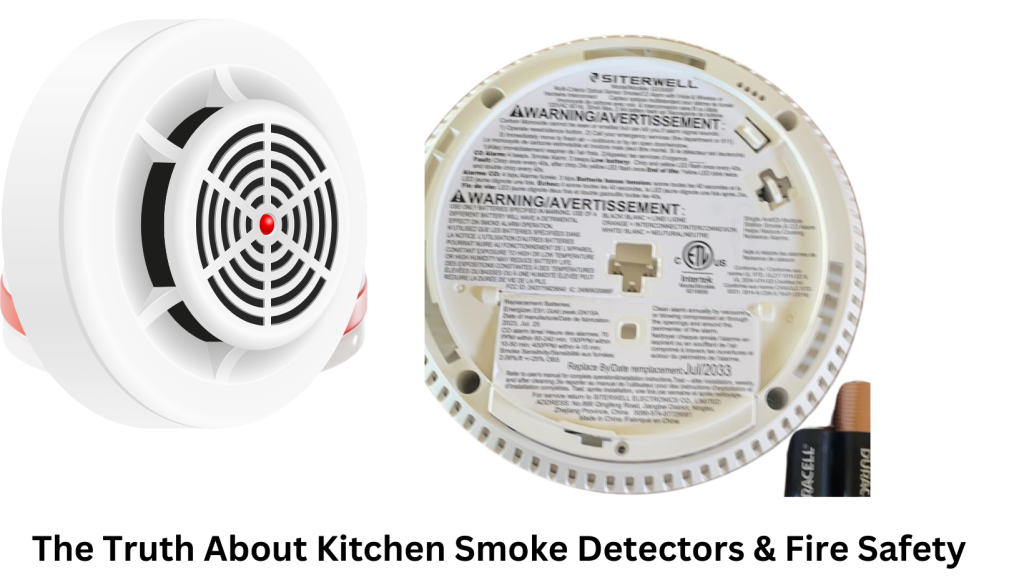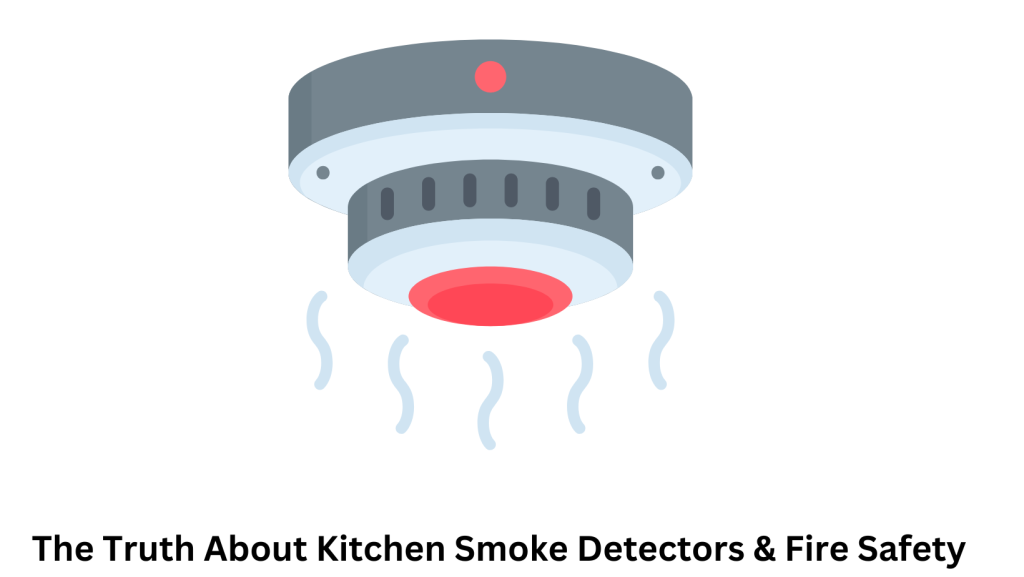Can you envision whether your kitchen space requires smoke detector installation? People generally ignore this concern until fire accidents occur. Home fires receive numerous reports from the kitchen yet many homeowners doubt the necessity of smoke detector installations in this area.
Kitchens pose difficulties for maintaining proper fire safety measures. Smoke detectors remain essential throughout all spaces of a house yet they activate readily when humans prepare food. The result becomes confusion together with frustration.
The Role of Smoke Detectors in Home Safety
Smoke detectors play a vital role in keeping your home safe. They alert you quickly if there’s a fire, giving you time to escape or take action. These devices are life-saving, especially since fires can spread rapidly. A smoke detector can make the difference between a small fire and a disaster.
There are two main types of smoke detectors: ionization and photoelectric. Ionization detectors are quick to sense small, fast-flaming fires. They work by using a small amount of radioactive material to detect smoke particles. Photoelectric detectors, on the other hand, are better at sensing larger, smoldering fires. They use a light beam to detect smoke when it interrupts the beam.
When it comes to building codes, many areas require smoke detectors in certain parts of the house, such as hallways and bedrooms. However, there are specific rules about placing them in the kitchen. Generally, smoke detectors are not required to be installed directly in the kitchen to avoid constant false alarms. Instead, detectors should be placed nearby, like in the hallway or near the door, where they can still detect smoke without reacting to normal cooking activities.
Legal Requirements: What Do Building Codes Say?
The codes established for smoke detectors and fire safety protection exist to shield both your dwelling and residents. The National Fire Protection Association (NFPA) maintains standardization rules for ensuring homes are protected from fire incidents through which many local jurisdictions adopt these measures. The vital question concerns whether smoke detectors must be installed in kitchen spaces.
Municipal regulations rarely establish a necessity for installing a smoke detector inside kitchen areas. Since kitchen activities generate steam and smoke those areas may trigger false alarms to smoke detectors. Per regulatory guidelines detectors should not be located inside the kitchen area yet need to stay as nearby as a hallway or living area. The detector maintains its ability to detect smoke and fire by not generating false alarms when cooking occurs.

It’s important to follow these rules and make sure your home meets local fire safety regulations. Not only does it keep you safe, but it can also help you avoid penalties or fines for not complying with the law. So, check your local building codes and make sure you have the right setup in place to protect your home and family.
Why You Might (or Might Not) Need a Smoke Detector in the Kitchen
When it comes to placing a smoke detector in your kitchen, there are valid reasons for both sides of the argument.
Why you might (or might not) need a smoke detector in the kitchen depends on safety and practicality. A smoke detector can alert you to potential fires, making it an essential safety feature. However, placing it too close to cooking areas may lead to frequent false alarms from steam and smoke. To strike a balance, experts recommend installing heat detectors or placing smoke alarms at a safe distance from stoves and ovens.
Why You Might Need One: Kitchens are one of the most common places for fires to start. Cooking, especially with oil or open flames, can quickly lead to a dangerous situation. Having a smoke detector nearby can alert you to a fire in its early stages, giving you valuable time to respond before things get out of hand. This is especially important in homes with children or elderly individuals who may need extra time to react.
Why You Might Not Need One: On the other hand, smoke detectors are easily triggered by cooking smoke or steam, like burnt toast or boiling water. This can cause false alarms, which are annoying and may lead to people ignoring the detector’s alerts. Fire codes usually recommend placing smoke detectors outside the kitchen, in nearby hallways, or living areas, to avoid these false alarms. For kitchens, heat detectors are a better option, as they only go off when there’s a dangerous temperature rise, not just smoke.
So, do you need a smoke detector in the kitchen? It depends. If you cook frequently or have a higher risk of fire, having one close by can be helpful. However, if your cooking often creates smoke or you want to avoid false alarms, placing a detector outside the kitchen and using a heat detector inside may be a better choice. Consider your cooking habits and home situation to make the best decision for your family’s safety.
Alternative Fire Safety Devices for the Kitchen
Alternative fire safety devices for the kitchen provide extra protection without the hassle of frequent false alarms. Heat detectors, fire extinguishers, and automatic fire suppression systems are great options for preventing and controlling kitchen fires. Fire-resistant blankets and stovetop fire suppressors can also help in emergencies. By choosing the right safety devices, you can keep your kitchen secure while avoiding unnecessary interruptions.
If a smoke detector isn’t the best choice for your kitchen, other fire safety devices can help protect your home without the risk of false alarms. One of the best alternatives is a heat detector.
Heat detectors are designed to sense rapid temperature changes, not smoke. This makes them ideal for kitchens, where cooking can produce smoke or steam. When the temperature in the kitchen rises quickly, such as from a fire or a pan getting too hot, a heat detector will trigger an alarm. This helps prevent false alarms from everyday cooking activities like boiling water or toasting bread.
Placing a heat detector in the kitchen is often recommended by fire safety experts. It gives you an added layer of protection without the annoyance of smoke detector alerts during normal cooking. If you want a safer kitchen while avoiding false alarms, a heat detector could be the perfect solution.
Proper Placement of Smoke Detectors
The proper procedures for where to install smoke detectors next to kitchen areas are essential for maintaining their effective operation while preventing unnecessary alerts. All smoke detectors must be mounted on ceilings because smoke has a natural tendency to rise. The positioning on the ceiling maximizes the accuracy of smoke detection by the detector.
The correct placement of smoke detectors requires keeping them 10 feet away from kitchen cooking appliances including stoves and ovens. Having such a distance protects the detector from accidental triggering by common cooking vapor. The detector placed in hallways or outside kitchen doors gives warning capabilities while preventing unnecessary alarms from kitchen activities.
The fitness of your smoke detectors depends on both correct positioning as well as regular maintenance efforts. You must examine the batteries periodically to verify their function while also running monthly tests to confirm the detector produces the necessary alarm signal. Regular maintenance and proper function of your smoke detectors form an easy yet vital method for protecting your family alongside your home.

When Should a Kitchen Have a Smoke Detector?
There are certain situations where a smoke detector might be necessary in the kitchen. In some kitchens, it’s essential for safety.
For example, in small or poorly ventilated kitchens, smoke can build up quickly. Without proper airflow, smoke may linger longer and create a bigger risk. In these cases, a smoke detector can help detect any fire or smoke before it spreads.
Another instance where a smoke detector is important is when there is a higher fire risk. If you use a deep fryer, work with open flames, or handle flammable materials in your kitchen, the chances of a fire increase. A smoke detector can alert you quickly in these high-risk situations, giving you more time to react.
So, should a kitchen have a smoke detector? In these specific cases, yes. If your kitchen is small, poorly ventilated, or has a significant fire risk, installing a smoke detector can be a lifesaver. However, make sure it’s placed correctly to avoid false alarms, such as outside the kitchen or near the door.
Common Misconceptions About Smoke Detectors in Kitchens
Common misconceptions about smoke detectors in kitchens often lead to improper installation or removal. Many believe that smoke detectors should not be used in kitchens due to frequent false alarms, but proper placement can prevent this issue. Others assume all detectors work the same, but heat detectors may be a better option near cooking areas. Understanding the right type and location of fire safety devices ensures better protection without unnecessary disruptions.
Many people misunderstand how smoke detectors work in kitchens. Let’s clear up a few myths:
Myth 1: Smoke detectors only belong in bedrooms or hallways.
Some think smoke detectors are useless in kitchens, but this isn’t true. You can install one in or near your kitchen, but placement matters. It’s best to keep it at least 10 feet away from cooking appliances to avoid false alarms.
Myth 2: Cooking never sets off a smoke detector.
This is a big misconception. Smoke from burning food or even steam can trigger a detector. However, modern smoke detectors, like those with adjustable sensitivity, are less likely to react to everyday cooking.
So, can you put a smoke detector in the kitchen? Yes, but do it thoughtfully. Avoid placing it directly above the stove or too close to the oven. Consider using heat detectors or detectors designed for high-sensitivity areas if false alarms are a concern.

Safety Best Practices for Kitchen Fire Prevention
Kitchen fires can happen quickly, but following a few simple steps can help you avoid them:
- Never leave cooking unattended. If you need to step away, turn off the stove. Fires often start when food is left cooking without supervision.
- Keep flammable items away from stovetops. Dish towels, paper towels, and wooden utensils can catch fire easily. Always store them at a safe distance.
- Clean grease traps regularly. Built-up grease is a fire hazard. Clean your stovetop and range hood to reduce the risk.
- Test smoke detectors regularly. A working smoke detector can save lives. Test it monthly and replace the batteries twice a year.
Practicing safety best practices for kitchen fire prevention is essential to protect your home and loved ones. Always stay attentive while cooking, never leaving food unattended on the stove. Keep flammable items like dish towels, paper towels, and curtains away from heat sources. Ensure your kitchen is equipped with a functional fire extinguisher and smoke detector, testing them regularly. Avoid grease buildup by cleaning cooking surfaces frequently, as grease fires can ignite quickly. Lastly, know how to respond in case of a fire—never use water on a grease fire; instead, smother it with a lid or use baking soda.
Conclusion: The Bottom Line on Smoke Detectors in the Kitchen
Protecting your kitchen with proper fire safety measures is essential. While smoke detectors are vital throughout your home, their placement in or near the kitchen requires extra care. Proper positioning can prevent false alarms caused by cooking. Heat detectors are another option for kitchens, especially in areas prone to steam and smoke.
The best choice depends on your kitchen layout, local fire safety laws, and personal needs. Always ensure you have working fire safety devices, whether a smoke detector or a heat detector, to protect your home and family.
FAQ: Smoke Detectors and Kitchen Fire Safety
Do I need a smoke detector in the kitchen?
While it’s not always mandatory, having a smoke detector near the kitchen adds an extra layer of safety. Proper placement ensures it’s effective without causing unnecessary false alarms.
Is a smoke detector required in the kitchen by law?
This depends on local fire codes. Some areas may require smoke detectors in or near kitchens, while others recommend alternative devices like heat detectors. Check your local regulations for specifics.
What is the best fire safety device for a kitchen?
Heat detectors or smoke detectors with adjustable sensitivity work best for kitchens. These devices are less likely to react to everyday cooking activities while still providing protection.
Should a smoke detector be installed near the stove?
It’s best to avoid placing a smoke detector directly near the stove. Instead, install it at least 10 feet away to reduce false alarms while maintaining safety.
Can I put a smoke detector in the kitchen without triggering false alarms?
Yes, you can. Choose a smoke detector designed for high-sensitivity areas or one with a hush button. Proper placement and regular cleaning can also minimize false alarms.

I’m a writer and culinary expert with over 10 years of experience in the kitchen. As a graduate of the Institute of Culinary Education and a passionate home chef, I created KitchenBreez.com to share my knowledge of kitchen techniques, cooking tips, and the best kitchen gadgets. Whether you’re a seasoned cook or just starting, my goal is to help you make your time in the kitchen more efficient and enjoyable.
